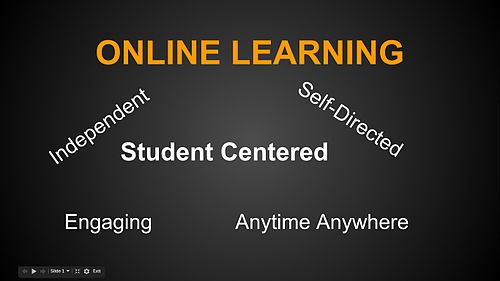Definitions
| Foundation Skills | |
|---|---|
| Online learning | |
| What is online pedagogy? | Objectives | Definitions | Online teaching | Summary |
Before a teacher can define or understand the meaning of online pedagogy, a few things need to be discussed. First of all, we know it has something to do with online learning and teaching. Secondly, in anthropological terms, online learning is in its infancy. So let's examine what online learning involves, when it all started and where it is heading.

- Online learning
began in the mid-nineties with the advent of the World Wide Web primarily to support students learning from a distance. This early approach was adopted in varying degrees by organisations until 2000s, and comprised a primarily text-based method for delivering digital content (Caplan & Graham, 2008). Printing costs for organisations were reduced, and students could access the material they needed for their study much faster, but only if they had a computer and could get on the Internet (Ally, 2008). For the lucky learners who had ready access to a computer and broadband, learning became more flexible, and they could study anytime they pleased, anywhere (at home, work or in the community) and anyhow (self-paced and using different media). Online learning has changed from the initial days of homegrown online systems (cobbled together by enthusiastic 'early adopters') into more prolific use of formal Learning Management Systems (e.g., Moodle, Blackboard), and in some cases the distributed social networked learning approach where a variety of Web 2.0 technologies and approaches are used, and self-organised by the learner within a personal learning environment. Blended learning has become much more prevalent with students physically attending some classes or tutorials, and also studying online. More about that later.
- Definitions of online learning
- The use of the Internet to access learning materials; to interact with the content, instructor, and other learners; and to obtain support during the learning process, in order to acquire knowledge, to construct personal meaning, and to grow from the learning experience (Ally, 2008, p. 17).
- A form of distance education mediated by technological tools where learners are geographically separated from the instructor and the main institution (Hartnett, 2016, p. 7).
Online learning is considered to have many benefits for both learners and teachers.
- Flexibility and easier access to learning - anytime, anywhere and anyhow - regardless of location and other commitments.
- Accessible and interactive distance learning - opportunities for student-teacher, student-student as well as student-content interactions.
- Cheaper or no cost education in a variety of platforms. (WikiEducator is one of them) Also, Massive Open Online Courses (MOOCS) - Coursera, Udacity, Khan Academy, edX and many more. (A comprehensive list of MOOCs is available.)
- More easily accessible open and shareable materials - open educational resources (OER).
Did you know that Otago Polytechnic is hosting the Open Education Resource universitas (OERu)? Anyone can register for micro-courses (4 credits) on a variety of topics and study informally with the option of being accessed to obtain credits. Online learning is evolving rapidly, and anyone anywhere can engage in learning pretty much whatever topic they are interested in. So where does this leave formal education? Well we know this much, potential learners can pick and choose from a vast array of free online courses so I expect they will be expecting a lot from a course that costs money.
- Definition of online pedagogy
- the art of teaching a fully online course - a working definition outlined by Abigail Scheg (2014 p. 107).
This means that teachers need to develop skills in planning, designing and developing their online courses, as well as in selecting teaching strategies that engage students. This involves the design of the learning environment and the educational technologies, and also the way in which activities, interactions, content, and assessments, both formative and summative, will be presented to students. More detail will be provided in the next module - Online teaching.
In case you are wondering, online learning and eLearning are different, although the terms are often used synonymously. elearning is short for electronic learning and requires other media in addition to online, for example, CDs, DVDs and audio.
|
References
- Ally, M. (2008). Foundations of educational theory for online learning. In Terry Anderson (Ed) The theory and practice of online learning. (2nd Edn) Athabasca University, Canada: AU Press. Retrieved from http://cde.athabascau.ca/online_book/second_edition.html
- Caplan, D. & Graham, R. (2008). The development of online courses. In Terry Anderson (Ed) The theory and practice of online learning. (2nd Edn) Athabasca University, Canada: AU Press. Retrieved from http://cde.athabascau.ca/online_book/second_edition.html
- Hartnett, M. (2016). Motivation in online education. Singapore: Springer Verlag Singapore.
- Scheg, A. (2014). (Ed.) Reforming Teacher Education for Online Pedagogy Development. Advances in Higher Education and Professional Development (Ahepd). Harrisburg, PA, United States: Idea Group,U.S. (Available as an ebook for enrolled students at Robertson library in Dunedin.)